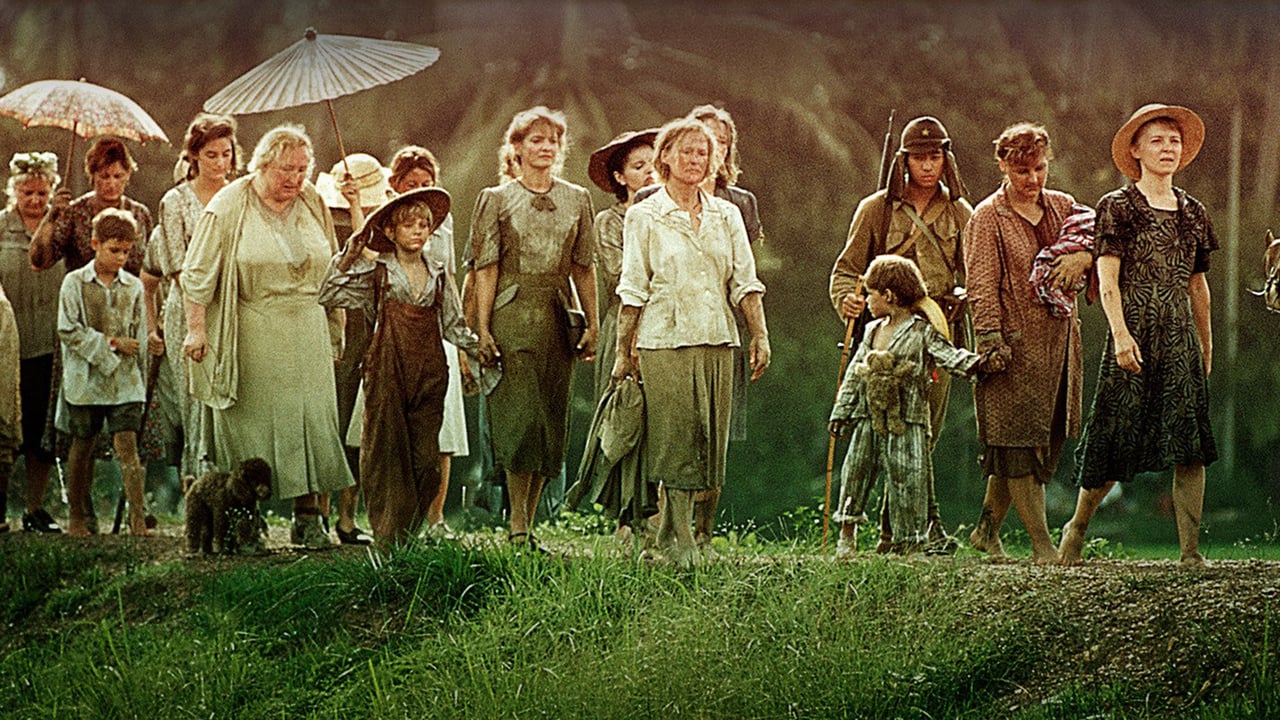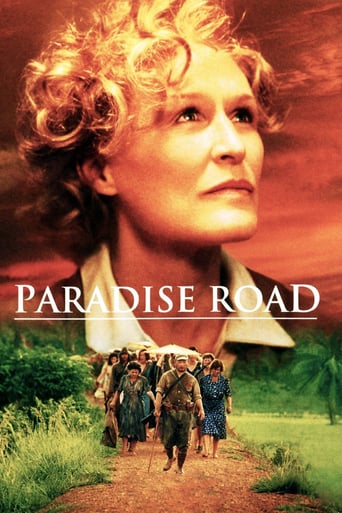



Excellent but underrated film
Best movie ever!
Easily the biggest piece of Right wing non sense propaganda I ever saw.
View MoreThe story, direction, characters, and writing/dialogue is akin to taking a tranquilizer shot to the neck, but everything else was so well done.
View MoreGood, but not great. Interesting story of survival, but it's not that original. There had been numerous WW2 POW / survival-through-unbearable-hardship movies before this, and this isn't that different from those. Plus, writer-director Bruce Beresford pulls his punches with regard to Japanese atrocities in WW2 - the reality was a lot worse than the movie makes out. Emotional and interesting nevertheless.Good cast - Glenn Close, Frances McDormand, Cate Blanchett, Julianna Margulies, among others - and they all give solid performances.
View MoreAs someone interested in history, I found this movie totally laughable. In fact, it was so bad I could barely laugh. Don't get me wrong, I'm not one of those people who require absolute authenticity in a movie just because it is based in history. After all, movies are dramas and dramas require dramatic license. But This script was so awkward, with the most unbelievable and contrived conversations and dialog. For instance, the women on detail doing work on the men's baths are not likely to be discussing penis size casually. The Japanese, who did commit atrocities, were not likely to have burned a woman alive for a small crime. Not because they were unaccustomed to cruelty, but because fuel was scarce. One dimensional characters, unsophisticated plot. In short, this movie had fake dialog, unbelievable premises, and was a waste of time. if you would like to see a good movie about POW life, Try Empire of the Sun. Even Merry Christmas Mr. Lawrence had believable moments, despite its convoluted agendas. Everyone voted to give this movie an average of 6.8 stars must have been on the cast.
View MoreIt's 1942 Singapore. Adrienne Pargiter (Glenn Close) joins the women and children evacuating from the approaching Japanese only to have their ship sunk. She and others swim ashore to Sumatra and imprisoned in an internment camp. As they face mounting brutal treatment, they decide to organize a choir.There are a lot of great actresses here; Frances McDormand, Pauline Collins, Cate Blanchett, Julianna Margulies plus many many others. The different characters can get to be too numerous. However the main characters played by the better known actresses remain center stage. Ten years before, the stories would be shocking and ground breaking. After Schindler's List, that kind of inhumanity is no longer as shocking and it seemed that this movie held back the most shocking visuals. For example, when the woman gets burnt alive, we are barely allowed to see anything. The beatings were all stage crafted. They could have stage a more brutal vision.
View MoreParadise Road is based on the true story of women POWs in Sumatra during WWII. The film, for the most part, follows what really happened... with one glaring exception!The incident that is prominently missing from Paradise Road is the Bangka Island massacre, which was one of the worst atrocities committed against women POWs during WWII and is an integral part of this story.After their ship, The SS Vyner Brooke, was sunk, the survivors made for the nearest land which was Bangka Island. They came to shore in different places but a group of more than a hundred people ended up on Radji beach. The group consisted of 22 Australian Army nurses, some civilian men, women and children, and 30 British soldiers from another ship which had been sunk. The island was fully occupied by the Japanese and the group unanimously decided to give themselves up. The group leader set off to find someone to surrender to. The civilian women and children began walking towards the main town on the island. The 22 nurses remained behind with the men and the soldiers (many of whom were badly wounded), an elderly British woman also remained with her wounded husband.When the group leader returned with a group of 20 Japanese, they ignored all requests for surrender. The Japanese shot and bayoneted the men, then ordered the 23 women to walk into the ocean. When they reached waist depth, the Japanese open fired with a machine gun and mowed the women down.There was one survivor. One of the nurses, Vivian Bullwinkel, was shot through the side and survived by pretending to be dead. She hid in the jungle for 12 days, caring for a British soldier who had been bayoneted and left for dead (he later died). Eventually, she gave herself up and was re-united with the rest of the women in the prison camp in Muntok. When she told them what had happened on the beach and they quickly realised that they would all be killed if the Japanese learned there was a witness to the massacre. So they made a pact not to speak of it again until they were free.Paradise Road is a fictional film based loosely on fact, not a documentary. Sometimes it is necessary to make changes to the real sequence of events in order for the film's structure and pacing to work. I do accept this and I would prefer to see a good film rather than a accurate one.But in leaving out the massacre on the beach, the film does a disservice to these women. These women were aware, from the start of their internment, that the Japanese were capable of atrocities on a massive scale and that there was no safety in numbers. They lived in a constant state of fear that the Japanese would repeat such an act or learn that Vivian Bullwinkel had survived the massacre and kill them all.Paradise Road tries to portray Japanese atrocities with a fictitious incident where a woman is set on fire (which did not really happen) but this does not compare to the scale of the 80 people massacred on Radji beach and the effect it had on the women in the camp. There were 32 Australian Army nurses in the camp and the women who died on the beach were their friends and colleagues. They were from the same unit and had nursed together for the first two years of the war. All their interactions with the Japanese guards were coloured by the knowledge that they had murdered 22 of their friends in cold blood.Paradise Road is a very good movie and I suspect it will become the definitive film about female POWs during WWII. Which sadly means that the 22 women who were murdered on Radji beach will be lost from memory... and they deserve better than that.If you want to learn more about the women POWs of Sumatra, I suggest you read "White Coolies: Australian Nurses Behind Enemy Lines," the diary kept by camp survivor Betty Jeffrey, or read the biography "Bullwinkel" by Norman G. Manners. There is also an excellent 1985 documentary called "Song of Survival", and a really tacky episode of "Willesee's Australians" that dramatises the story of Vivian Bullwinkel.
View More